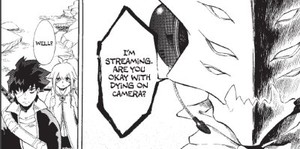The Fall 2019 Manga Guide
The Brave Tuber
What's It About?
 Zane is the wielder of a Holy Sword, which makes him uniquely equipped to take down the Demon King and all of his minions. There's just one catch – technology has developed to the point where his fantasy homeland now has the equivalent of Twitter and YouTube, and Zane's lack of personality makes him one of the least popular channels out there! No matter what he tries, he can't seem to get anyone but bad guys to follow him, and not even very many of those. Is there any hope for this would-be social media darling? And why is that somehow more important than defeating the Demon King? The Brave Tuber is written by Takahito Oosaki and illustrated by Ikuro. Seven Seas released the first volume in September and it is available in paperback ($12.99) and digitally ($9.99).
Zane is the wielder of a Holy Sword, which makes him uniquely equipped to take down the Demon King and all of his minions. There's just one catch – technology has developed to the point where his fantasy homeland now has the equivalent of Twitter and YouTube, and Zane's lack of personality makes him one of the least popular channels out there! No matter what he tries, he can't seem to get anyone but bad guys to follow him, and not even very many of those. Is there any hope for this would-be social media darling? And why is that somehow more important than defeating the Demon King? The Brave Tuber is written by Takahito Oosaki and illustrated by Ikuro. Seven Seas released the first volume in September and it is available in paperback ($12.99) and digitally ($9.99).Is It Worth Reading?

Rebecca Silverman
Rating:
The Brave Tuber has basically one joke, but since it's a good one, it manages to be a fun read despite the lack of anything else in the story. That's probably because the joke is one that blends the familiar with the fantastic: a sword-and-sorcery fantasy world with social media. Essentially the setting is fantasy Medieval with computers and the internet (but nothing else, really, so no cars) and somehow becoming a social media sensation has eclipsed actually defeating the Demon Lord. Not that Zane doesn't still want to solve that whole Demon Lord problem; in fact, he'd much rather do that than strike cheesy poses or pull stunts to get more followers. But his Holy Sword came with a spirit named Kuku who's much more invested in the whole video-and-(t)weet thing, so he's pretty well stuck.
As you might imagine, this means that the gag is mostly how incredibly bad Zane is at making videos and how that eclipses his awesome power with the sword. With the ongoing glut of stories about guys with magic swords being amazing and taking down various demon lords, that makes this book stand out as both a send-up of the genre (although it's not isekai) and as a slightly more pointed look at how obsessed with internet fame the world has become. That last may actually just be a side effect of the premise, of course; this doesn't feel like a story that's got a lot riding on having a serious underlying theme. But it is there if you want to look for it, like the way that Kuku accidentally gives away her location to the bad guys with a (t)weet or how the Demon Lord himself is following Zane in order to better understand what his enemy is up to. That this is really why he's following Zane comes out in the extra chapter, which is one of the funniest parts of the book; prior to that the gags hold up for a couple of chapters before starting to feel a little stale.
Overall, though, this is a fun time. It makes the most of its ridiculous premise and has a good time with it, and if the art isn't gorgeous, it definitely works with the style of humor. I'm not sure how long this can hold up, but I've had my doubts proven wrong before (Sleepy Princess in the Demon Castle, anyone?), so we'll just have to see.

Faye Hopper
Rating:
The Brave-Tuber is cute and pleasant. It's a funny, inventive riff on the fantasy genre that reflects a burgeoning cultural facet you don't often see depicted in media: Youtube Vlogerism. Yes, the Brave-Tuber's protagonists are aspiring Youtube stars. But unlike a lot of manga based around rising to the top of a given profession, Zane and Kuku are not good at making videos. At all. It's the primary root of the comedy (that and Zane being ridiculously powerful and no one noticing or caring) and is a good, unique pillar to hinge the jokes on (the Demon King getting into a flame war with them in the comments section is a real highlight). It's easy to find manga about hyper-competence and following your dreams to achieve your goals; it's rarer to find a manga about people who are not great at their craft but do it because, hey, got to make a living somehow. It's a series attuned to the zeitgeist: Zane and Kuku are broke, living in a roughshod shack overrun by monsters, and are always online. It's rare and refreshing to see the way so many young people live their lives (me included) reflected with specificity and accuracy.
The Brave-Tuber does have some execution issues, however. The skipping of action scenes could work as a comic choice, but it doesn't work because there's not enough of a lead-in. Oftentimes a page will be turned, and the demon of the day will have been vanquished without our hero so much as even lifting his sword. It makes the joke less impactful because what makes the joke funny is the subversion of expectation. You expect a grand, lush action sequence and instead are met with comic anti-climax. Without that setup, it comes off less as deliberate upset and more as not wanting to draw the action scene. This is endemic of Brave-Tuber's often less than stellar use of the manga medium, which frequently lets the jokes down.
The author's making-of comics speak to the primary appeal of the Brave-Tuber. The script writer submitted the prototype for this story thinking his agent was about to drop him, having issues with deadlines, and was incidentally picked up for series. The artist was handed this series to illustrate by the people he worked for, apparently having never worked on a serialization before. This lackadaisical, eh-whatever attitude is the series' major charm. Yes, it has issues with delivery and owes a debt to One-Punch Man in its millennial angst and nonchalant anti-climaxes. But while it certainly nowhere near as good as OPM, The Brave-Tuber does have enough merits of its own that I would recommend it to anyone intrigued by the premise or looking for a chill, good time.
discuss this in the forum (44 posts) |
back to The Fall 2019 Manga Guide
Feature homepage / archives